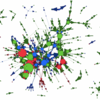Sarah Ferguson, Vincenzo Bollettino, Phuong Pham, Patrick Vinck, Rachel Dickinson, Alexis Smart, and Evan Bloom. 5/2020. “
Bangladesh Network Analysis Report”.
AbstractCoordination among actors during an emergency is crucial for effective, efficient action. The existence of pre-disaster relationships between actors can strengthen the speed with which coordination occurs in a disaster setting, making relationshipbuilding before a disaster an important element of preparedness. As such, understanding the relationships between stakeholders working to advance disaster resilience and response is a crucial first step to support institutional strengthening and capacity building. The Harvard Humanitarian Initiative (HHI), Concern Worldwide, and Jagrata Juba Shangha (JJS) are jointly implementing programs to enhance climate change adaptation and disaster resilience among coastal communities in Bagerhat District, Bangladesh. This district is located in Bangladesh’s low-elevation coastal zones, which are especially vulnerable to natural disasters and have already begun to see the effects of climate change. Bagerhat has high levels of food and water insecurity and poverty, and is highly vulnerable to natural disasters and climate change impacts (5). The district has been heavily impacted by recent cyclones, and is experiencing sea level rise and saltwater intrusion. This network analysis was undertaken to support strengthening coordination and collaboration among actors working on climate change adaptation and disaster resilience in Bagerhat.


